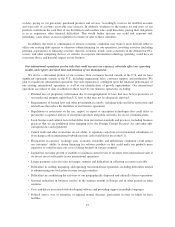Symantec 2012 Annual Report Download - page 102
Download and view the complete annual report
Please find page 102 of the 2012 Symantec annual report below. You can navigate through the pages in the report by either clicking on the pages listed below, or by using the keyword search tool below to find specific information within the annual report.• Acts of war or terrorism
• Intentional disruptions by third parties
• Health or similar issues, such as a pandemic
Any of the foregoing factors could cause the trading price of our common stock to fluctuate significantly.
Some of our products contain “open source” software, and any failure to comply with the terms of one or
more of these open source licenses could negatively affect our business.
Certain of our products are distributed with software licensed by its authors or other third parties under
so-called “open source” licenses, which may include, by way of example, the GNU General Public License
(“GPL”), GNU Lesser General Public License (“LGPL”), the Mozilla Public License, the BSD License, and the
Apache License. Some of these licenses contain requirements that we make available source code for
modifications or derivative works we create based upon the open source software, and that we license such
modifications or derivative works under the terms of a particular open source license or other license granting
third parties certain rights of further use. By the terms of certain open source licenses, we could be required to
release the source code of our proprietary software if we combine our proprietary software with open source
software in a certain manner. In addition to risks related to license requirements, usage of open source software
can lead to greater risks than use of third party commercial software, as open source licensors generally do not
provide warranties or controls on origin of the software. We have established processes to help alleviate these
risks, including a review process for screening requests from our development organizations for the use of open
source, but we cannot be sure that all open source is submitted for approval prior to use in our products. In
addition, many of the risks associated with usage of open source cannot be eliminated, and could, if not properly
addressed, negatively affect our business.
If we are unable to adequately address increased customer demands on our technical support services, our
relationships with our customers and our financial results may be adversely affected.
We offer technical support services with many of our products. We may be unable to respond quickly
enough to accommodate short-term increases in customer demand for support services. We also may be unable to
modify the format of our support services to compete with changes in support services provided by competitors
or successfully integrate support for our customers. Further customer demand for these services, without
corresponding revenues, could increase costs and adversely affect our operating results.
We have outsourced a substantial portion of our worldwide consumer support functions to third party
service providers. If these companies experience financial difficulties, do not maintain sufficiently skilled
workers and resources to satisfy our contracts, or otherwise fail to perform at a sufficient level under these
contracts, the level of support services to our customers may be significantly disrupted, which could materially
harm our relationships with these customers.
Accounting charges may cause fluctuations in our quarterly financial results.
Our financial results have been in the past, and may continue to be in the future, materially affected by
non-cash and other accounting charges, including:
• Amortization of intangible assets
• Impairment of goodwill and other long-lived assets
• Stock-based compensation expense
• Restructuring charges
• Loss on sale of a business and similar write-downs of assets held for sale
23
























